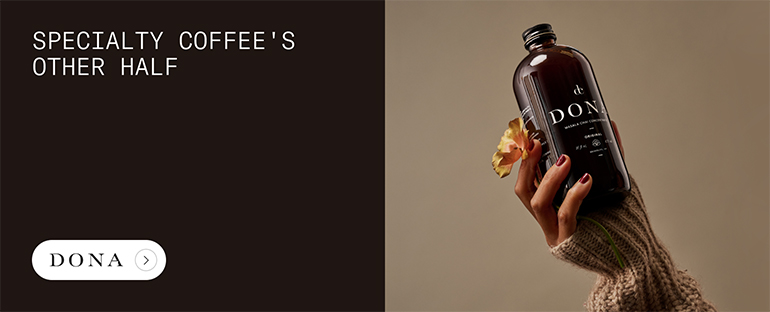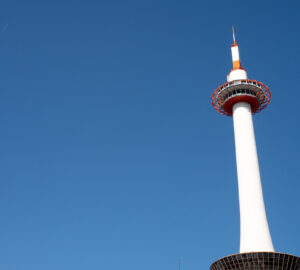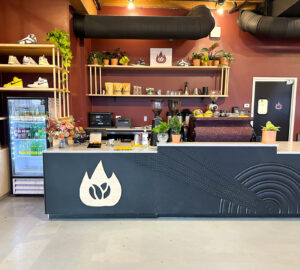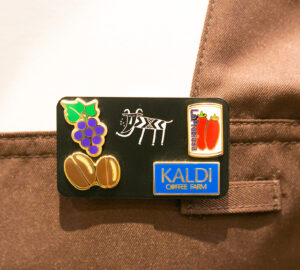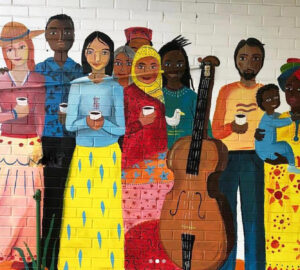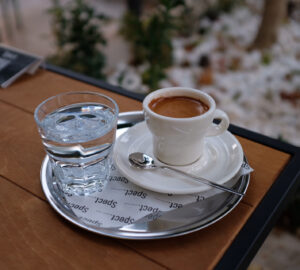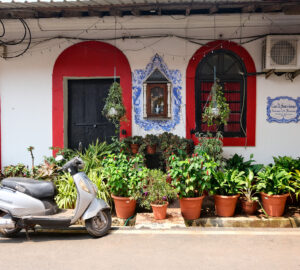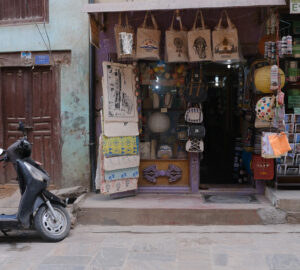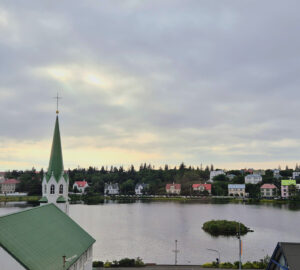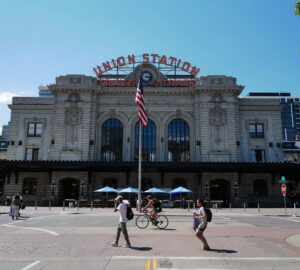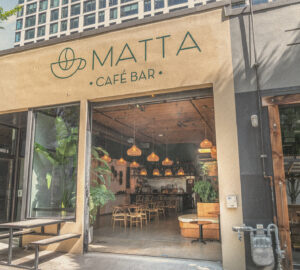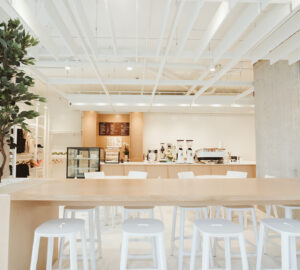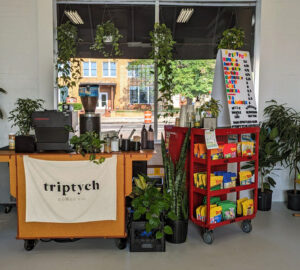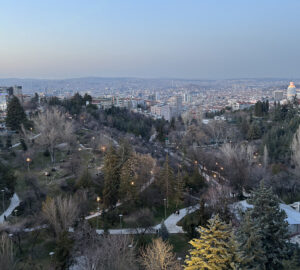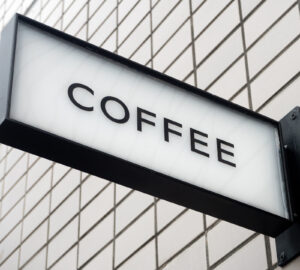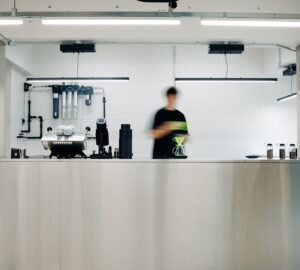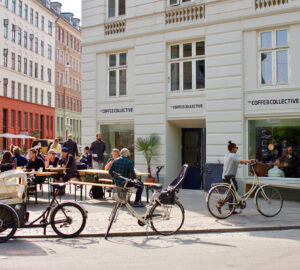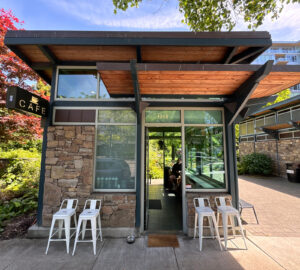A walk in the park, Brussels is not. In the Belgian capital, contrasts between the well-off and those in need can be stark. Street names and signs are given in two languages, though neighborhoods and their inhabitants tend to identify as either Francophone or Flemish-speaking, sometimes leading to notoriously nationalist identity politics and social strife. Majestic though they are, many of the monumental buildings look like they are forever in need of a power wash.
Despite these complexities, not to mention the city’s Eurocratic solemnity—it is known as the European Union’s “de facto capital” (the title itself evoking bureaucratic provisos and red tape)—Brussels’ mascot is the Manneken Pis. That this simple little statue of a naked boy urinating into a fountain attracts so much attention and celebration reminds us that humor and joie de vivre also exist here. So do chocolates galore, among many other famous local sweets (waffles, nougat) and treats (mussels, beer). Meanwhile, a contrast to all the traditionalist Belgian gastronomy is the novelty of specialty coffee. The scene is still young and the cafes are still very much countable, but that makes it all the more exciting. Here, then, are a variety of venues worth a visit.
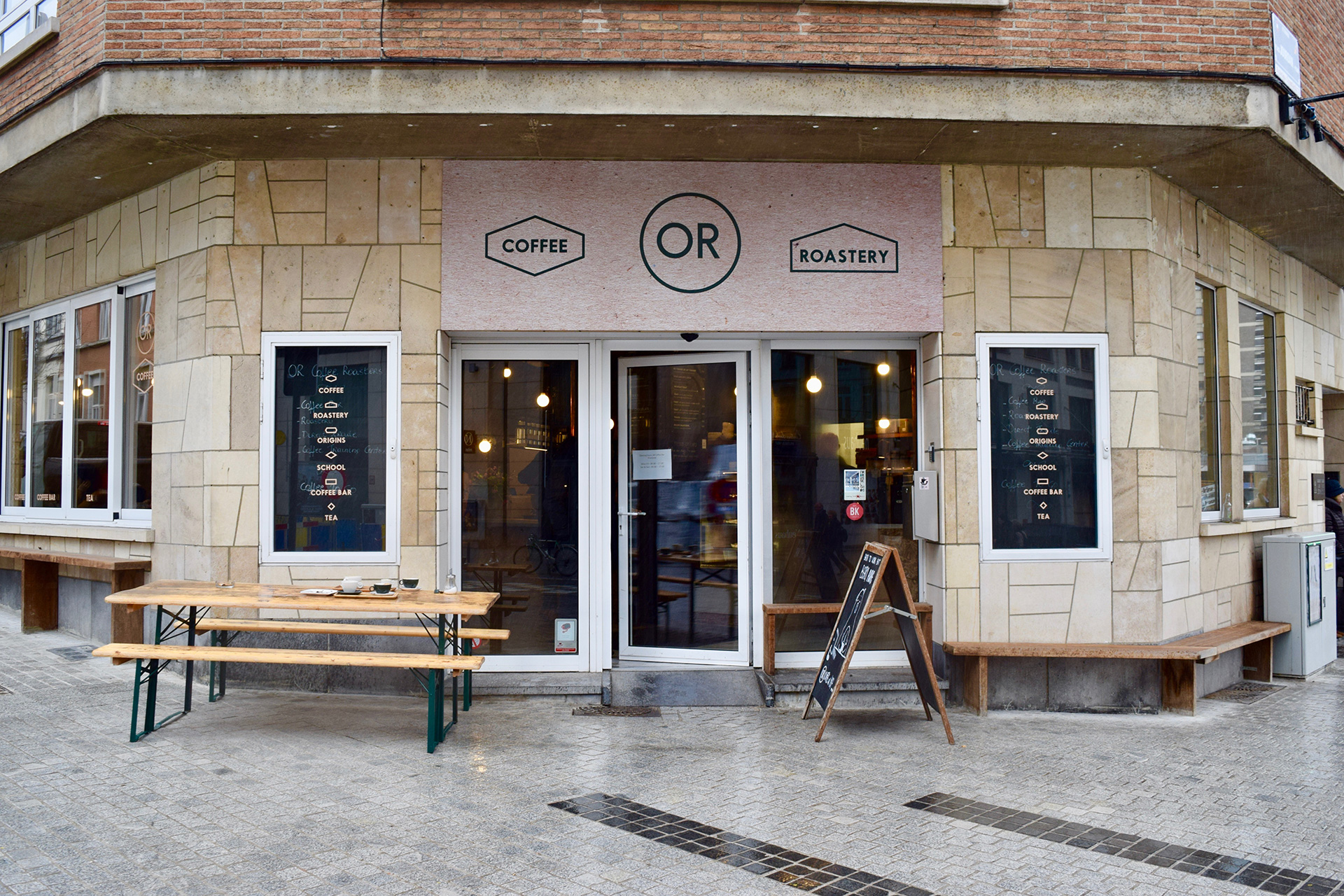
OR Coffee
Its name is a conjunction connecting choices, but visiting OR Coffee should not be a matter of choice when in Brussels. Many would agree that this brand brought specialty coffee to the Belgian capital, over a decade after Katrien Pauwels and Tom Janssen founded their own roastery in 2001. Today the couple has two cafes in Brussels, two in Ghent, and the OR coffee school and roastery in Westrem.
Flanked by a Marriott Hotel and a Bobbi Brown store, the Brussels’ city-center location, which opened in 2012, attracts a cross-section of clients, whose Flemish, French, and English conversations bounce animatedly off the bi-level brick walls. Coffee orders—taken at the counter but delivered to tables—might range from traditional espresso-based milk beverages to the most pronouncedly pampelmousse Kenyan à la Kalita this reporter has ever experienced. And in the Dutch and Flemish tradition, drinks are served with a little sweet on the side: here, a chocolate in OR’s signature forest green and gold packaging.
An estimated 95% of OR’s coffee is “direct fair trade,” says the company’s head of education, Wouter Helsen. This choice is facilitated by the close working relationship with Pauwels’ other business, Cup-A-Lot green coffee sourcers, and she and Janssen’s ability to personally travel to origin countries.
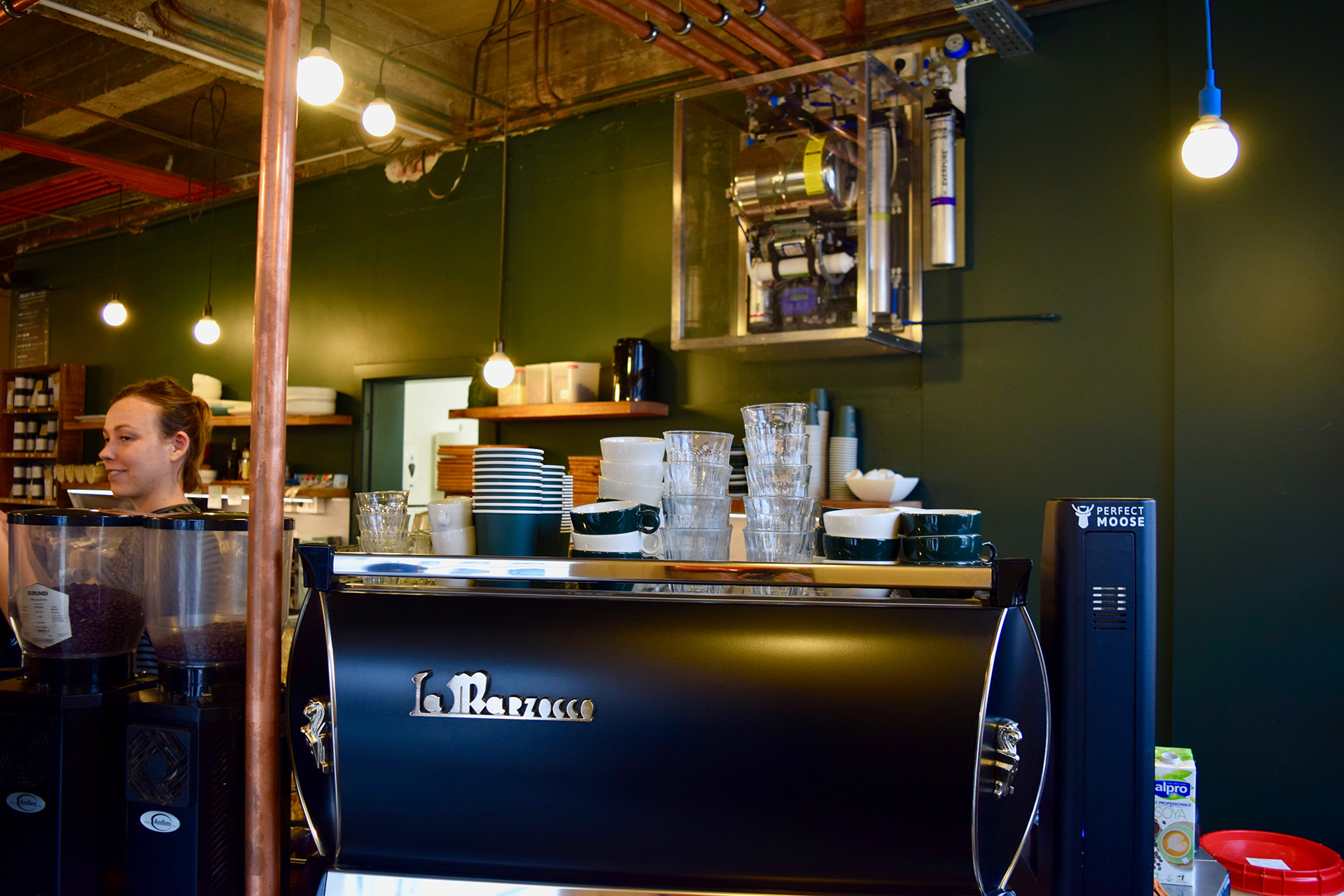
For equally appealing offerings and service, visit OR’s second Brussels branch in the municipality of Etterbeek. This cafe attracts the darker-suited set with business in and among the nearby European Commission and provides, for the coffeecrats among us, the cool sight of a Pentair water filter system with customized copper tubing wall-mounted like an objet d’art.
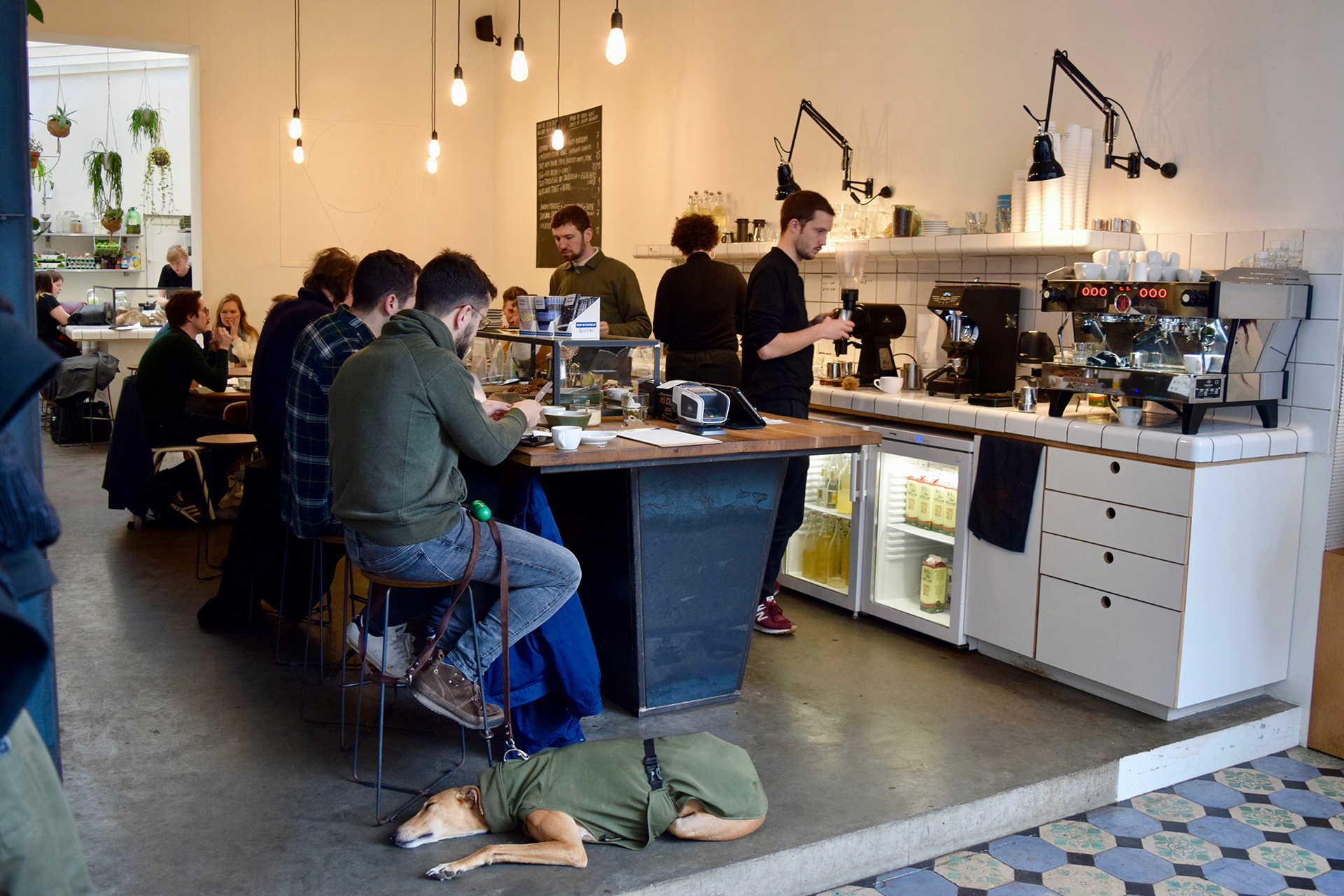
MOK
Like OR, MOK has its roots, roastery, and first coffee bar in Flanders, but its Brussels outpost has become the company flagship. Though founder and owner Jens Crabbé says he once felt namer’s remorse for the obvious choice—mok means “mug” in Flemish—he acknowledges it was an ode to filter coffee, experiencing a renaissance in the Low Countries when his business began almost eight years ago. And it remains fitting considering the scrutiny with which Crabbé develops his roasting profiles and brew recipes; unsurprisingly, he is Belgium’s reigning Cup Tasters Champion.
“It started off maybe quite small and cute and then, as I grew as a person,” says Crabbé, now just shy of 30, “my style started to change, and the brand kind of followed.”
With high ceilings, a communal table, a custom-designed shelving-cum-blackboard unit, and an open kitchenette producing vegetarian-friendly cold and hot breakfast and lunch, MOK is progressive in its aesthetics and taste. Being situated on the fashionable Rue Antoine Dansaert—from A.P.C. to Kartell, stylistas can shop in a straight line—is fitting, though MOK deftly balances chic and geek.
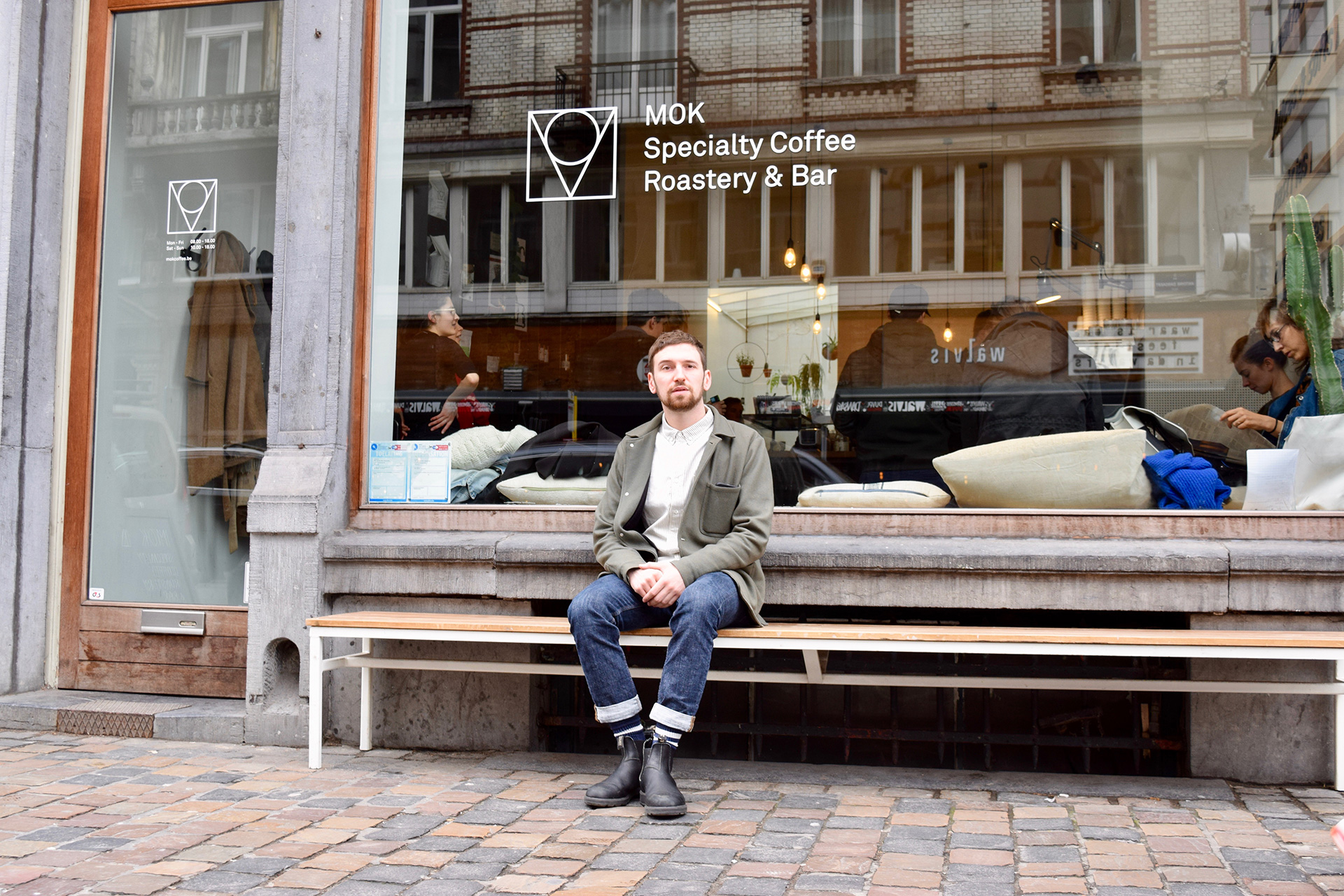
Riffing about MOK’s reverse-osmosis system and the different hardnesses for espresso and filter, Crabbé notes: “When people buy coffee we even encourage them [by saying], ‘Hey, take half a liter of water home from the tap, try it at home with our water. Water is really important, and we really try to like tick all the boxes to give you a good coffee experience.’”
Inasmuch as Crabbé enjoys living and working in his hometown of Leuven, he is seeking a new roasting space for MOK in the Belgian capital. “There’s a lot of work to be done still in Brussels in coffee, and we really want to be a part of that,” he says.
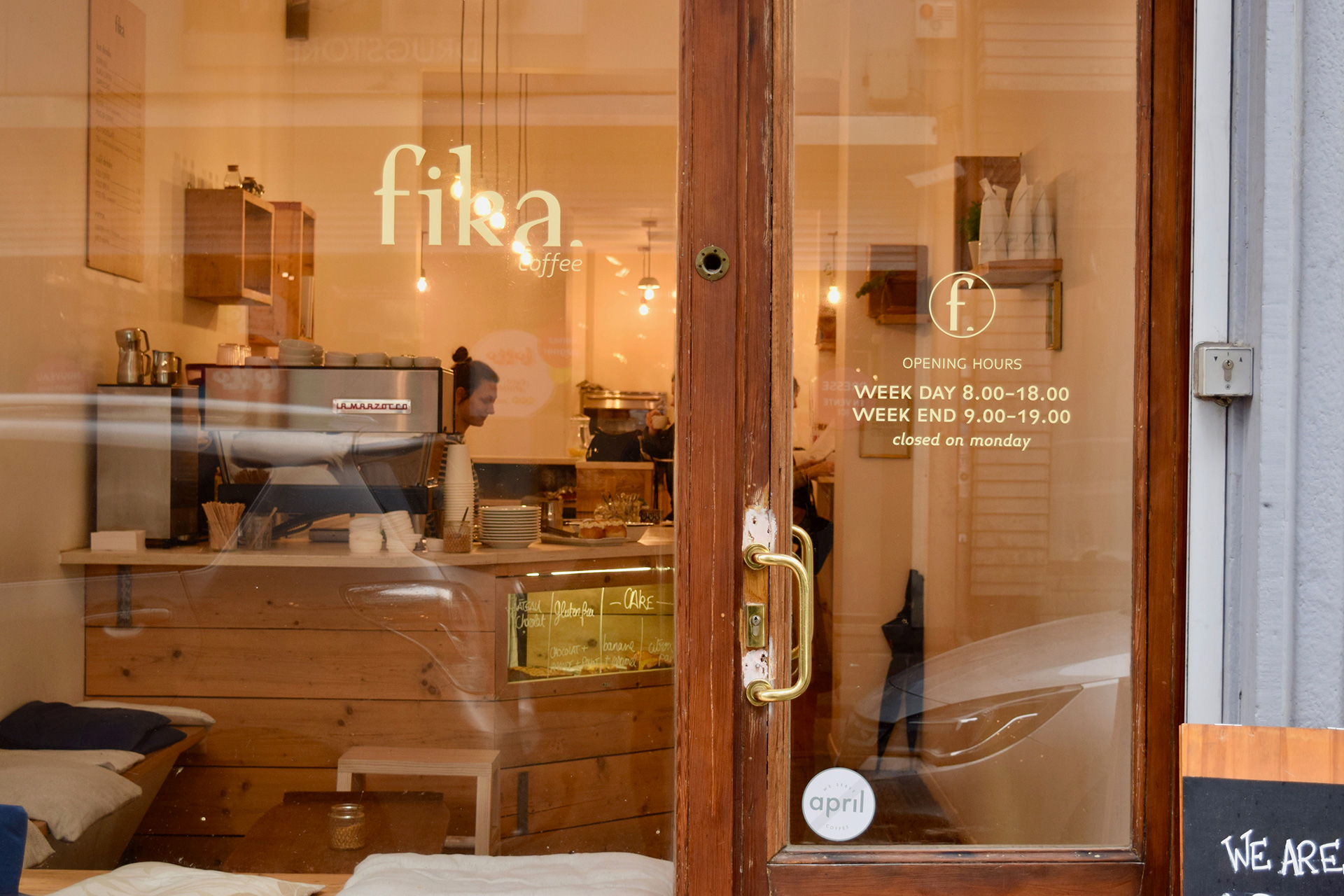
Fika
From light roasts in specialty coffee to clean lines in interior design, Scandinavia has contributed much to contemporary cafe culture around the world. In Brussels, however, Scandic style has yet to become big. And when Joana Soulard opened her homage to the Swedish coffee break in fall 2016, it was simply a commonsensical melding of two of her interests: specialty coffee and Scandinavian culture.
For filter preparations, Fika uses coffee roasted by April (founded by, indeed, a Swede), and is known to include Swedish favorites among its on-premise-baked pastries. “We have some Swedish [customers], but they come for the semla,” admits Soulard.
Of Fika’s city-central neighborhood, “it’s very mixed,” she says. The Matongé, as it is commonly known, is named after a district in Kinshasa, DR Congo, recognizing the many Congolese immigrants who have settled in the area over the last half-century; these days they are joined by other African communities and European Union-employed expats.
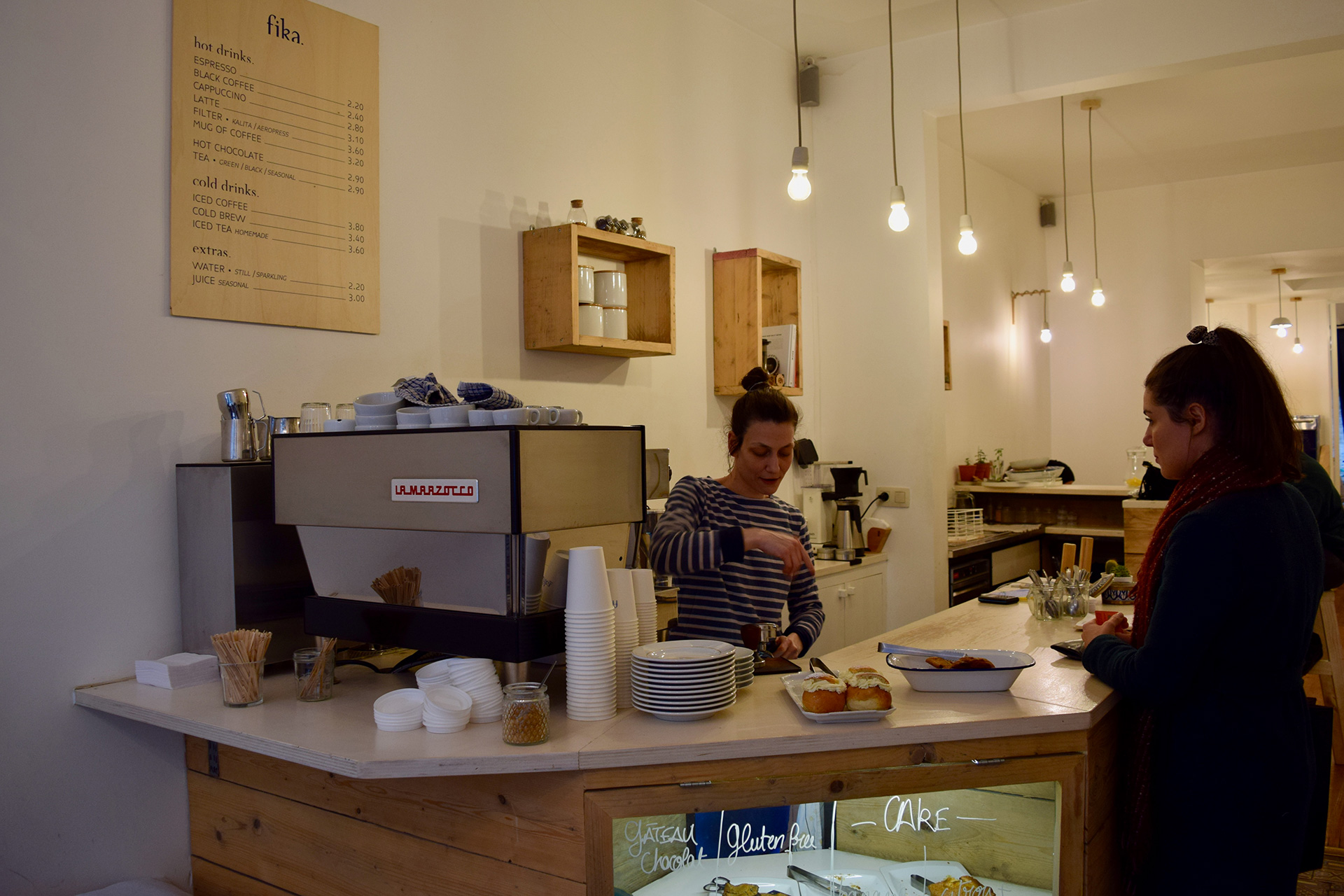
Fika does a lot of weekday morning takeaway, though during the day provides a peaceful spot to sit and sip. The venue, like its owner, is relaxed yet engaging; characteristically light wood and soft lines create a sense of holding space and hygge. That said, a non-Nordic nod goes to Café Capitale, the Brussels brand that supplies Fika’s espresso beans and a company whom Soulard credits with teaching her “everything about coffee” during her four-year employment there.
“For me, it’s important to use and to have some local products,” she adds.
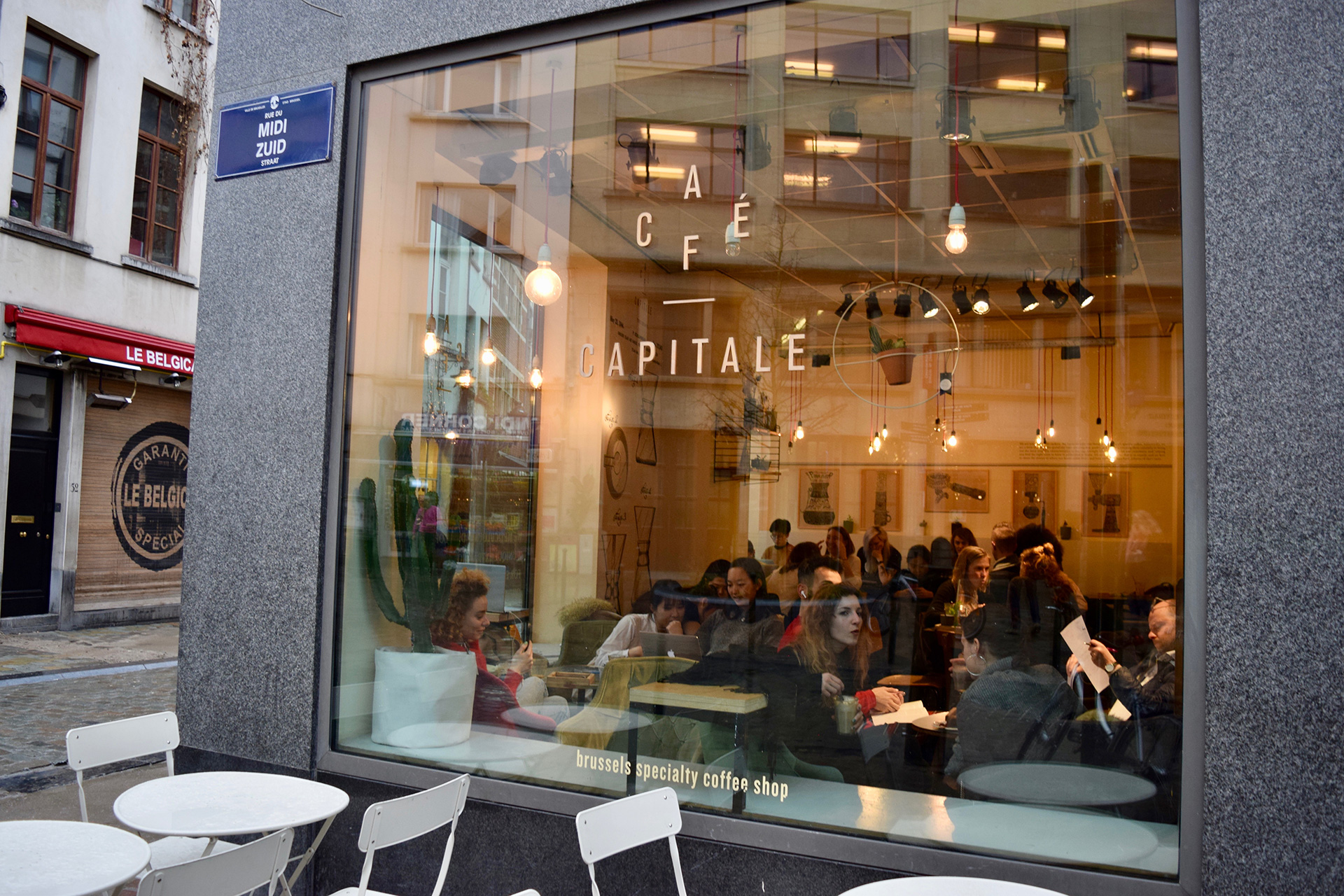
Café Capitale
Café Capitale is a crowd pleaser. Perhaps this is because founder François Lafontaine established his company in 2001 with ambience very much in mind, aiming for “cool places to drink coffee,” as he put it in a Coffee with April podcast. But fast-forward a dozen years, after inspiring visits to Sydney and Melbourne—having discovered “places where you sell only classic basic milk drink and filter coffee, with no whipped cream, no syrup and no topping and a huge line of customers”—Lafontaine rebranded and renamed his business. His focus turned to specialty coffee and he plunged into SCA courses, eventually becoming a certified roaster and Q grader.
Nowadays, Lafontaine owns and runs an atelier and bakery in nearby Uccle, the Brussels-based Belgian Coffee Academy, which has a roastery and a training center, and two cafes in Brussels.
The Café Capitale on Rue du Midi, which dates back to 2001, occupies a busy corner near the city’s iconic square, the Grand-Place. Vinyl spins on a turntable behind the bar and illustrations of coffee apparatuses act simultaneously as wall art and a visual education.
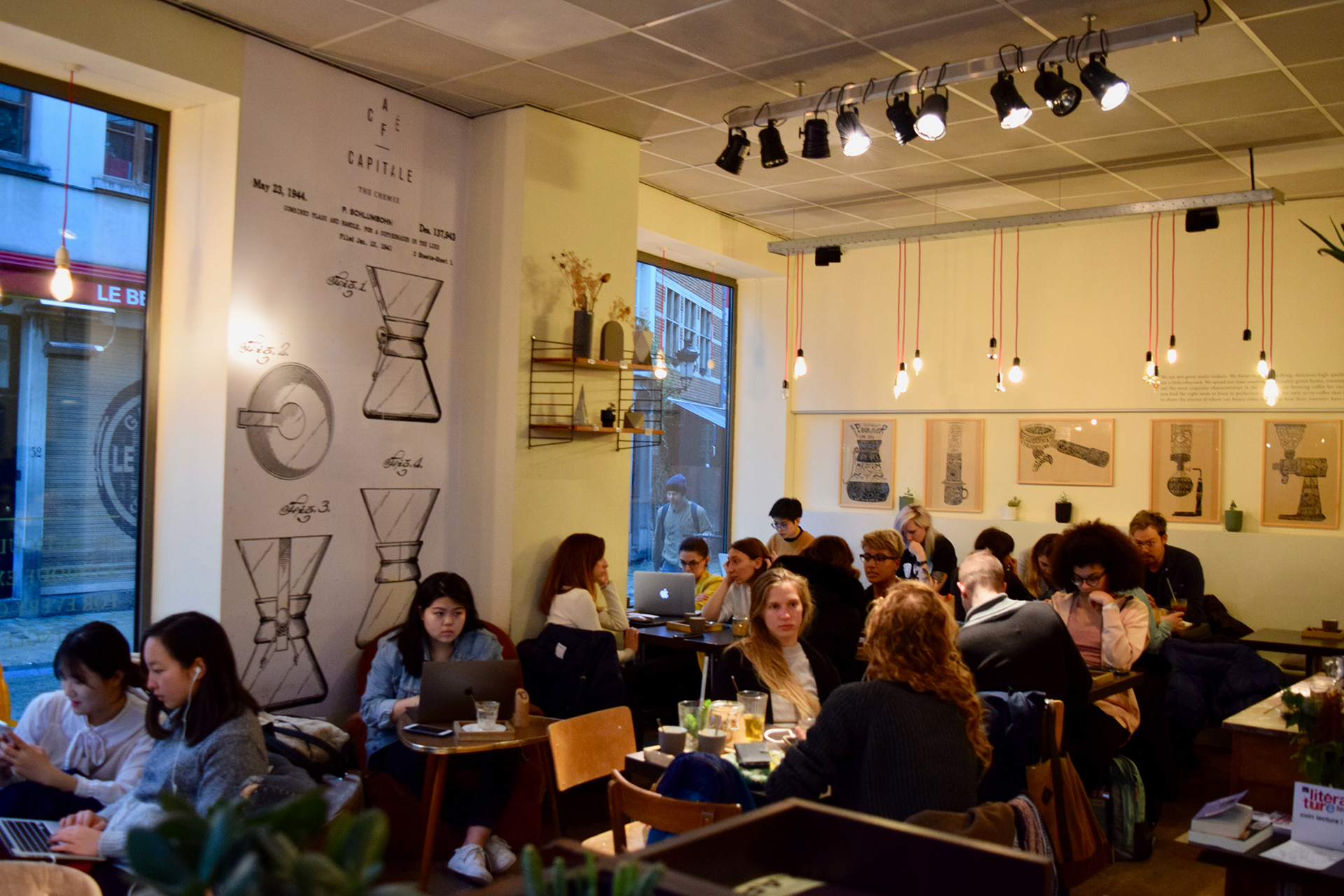
Alongside espresso-based drinks and filter coffees—V60 is the default, though AeroPress and Chemex are also available—the menu lists “three aromatic coffees from the past,” as Lafontaine terms them: “the mochaccino, the caramel macchiato, and the cappuccinut.” This reporter found the last—a syrup-sweetened hazelnut crunch-topped cappuccino—a perfect pre-prandial pick-me-up. And for those who prefer not to nibble from a drink, but rather, a dish, there is breakfast, lunch, and snack fare, with many of the carbohydrates produced by Café Capitale’s own bakery.
Less spacious but no less enticing, the branch on Rue Ernest Allard is in Sablon, just a 10-minute walk south.
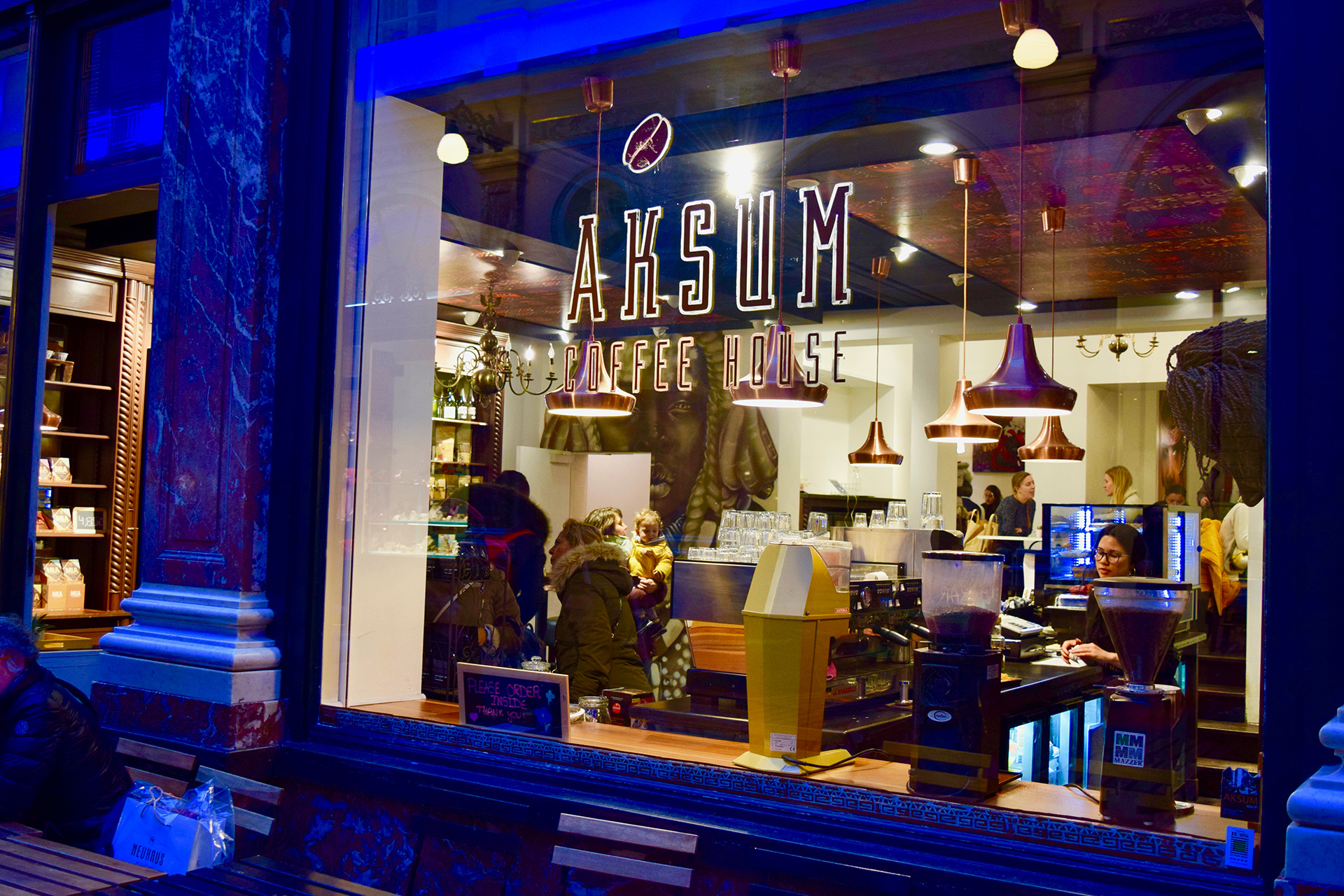
Aksum Coffee House
At Aksum Coffee House, do not expect an array of filter choices—in fact, on a recent visit, there was none on the menu, though a barista happily obliged when asked for one—nor conversations about water hardness and fruit-forward roast profiles. Be prepared, however, for a fine selection of espresso beans exclusively from Ethiopia, teas, chocolate, and baked goods, as well as a cost-free feast for the eyes in the form of rotating wall art by local street artists.
The Aksum brand has been around for a decade, but investor Vinod Gautam took it over about five years ago and, with the avid help of manager Fatima Boulben, began focusing on what Gautam calls organic, mainly small-cooperative-sourced Harar, Sidamo, Yirgacheffe, and Limu coffees roasted by Aksum’s own roastery. Though neither is Ethiopian—he is from India; her parents are from Morocco—the duo is intent on sharing Ethiopian coffee with the masses, and have ambitions to one day host Ethiopian dance and coffee ceremonies in Brussels.
Aksum Coffee House currently has three Brussels locations, though the most spectacular is in the renowned Saint-Hubert Royal Galleries, a 19th-century European shopping arcade (read: proto-mall). The Embassy of Ethiopia’s quarterly magazine called this branch, which opened in July 2017, “the temple of Ethiopian coffee in the city.”
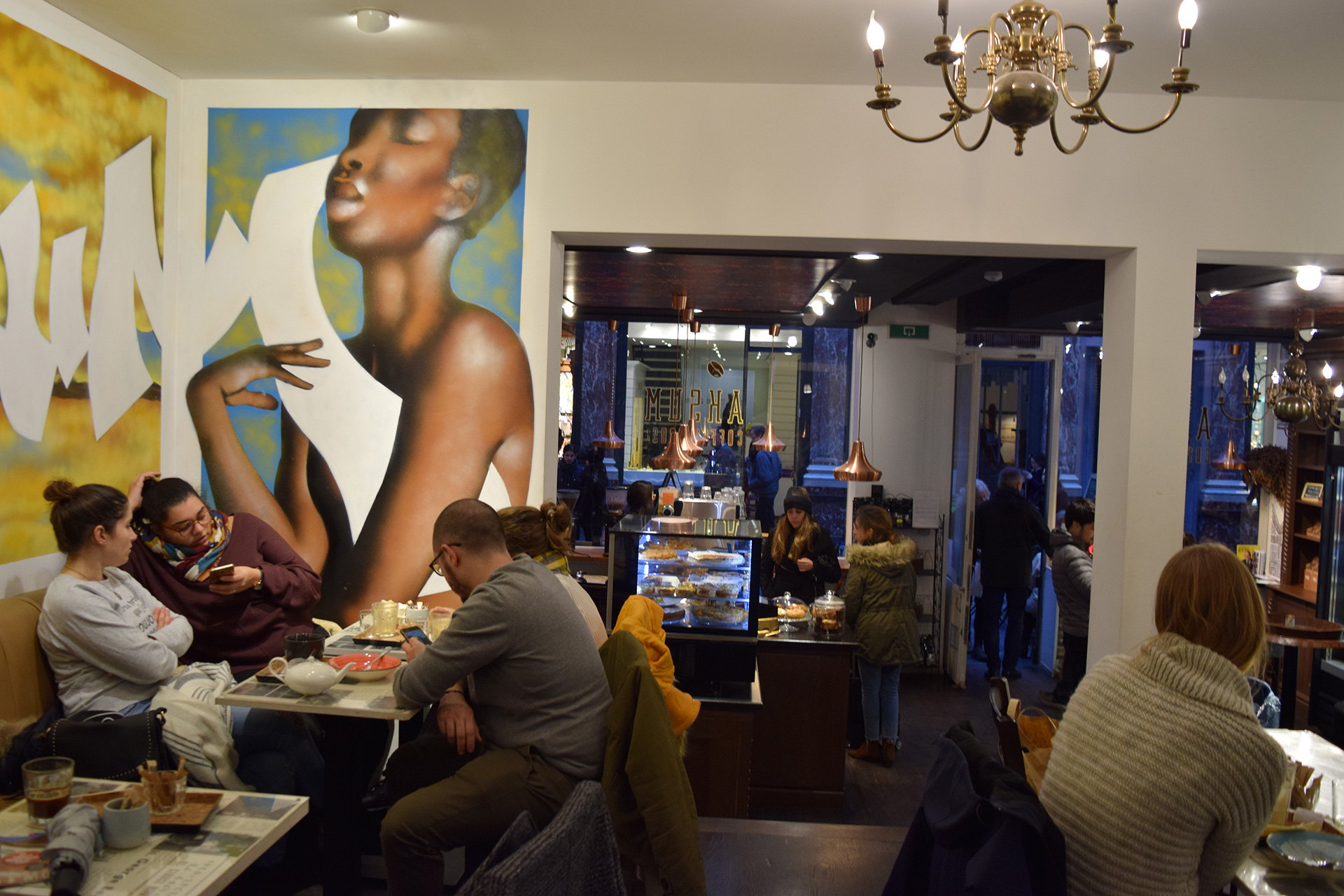
Amidst the arcade’s Old World boutiques and high-end chocolatiers, it radically offers a hangout spot, with friendly staff and room enough for small groups to share a table or solitary laptop workers to concentrate.
As Boulben describes her vision of Aksum: “It has to be a place where everybody should feel comfortable. From the high social level to the normal social level, they should all feel comfortable, because you know when you say ‘specialty coffee’ people straightaway feel afraid this is expensive.”
Karina Hof is a Sprudge staff writer based in Amsterdam. Read more Karina Hof on Sprudge.














